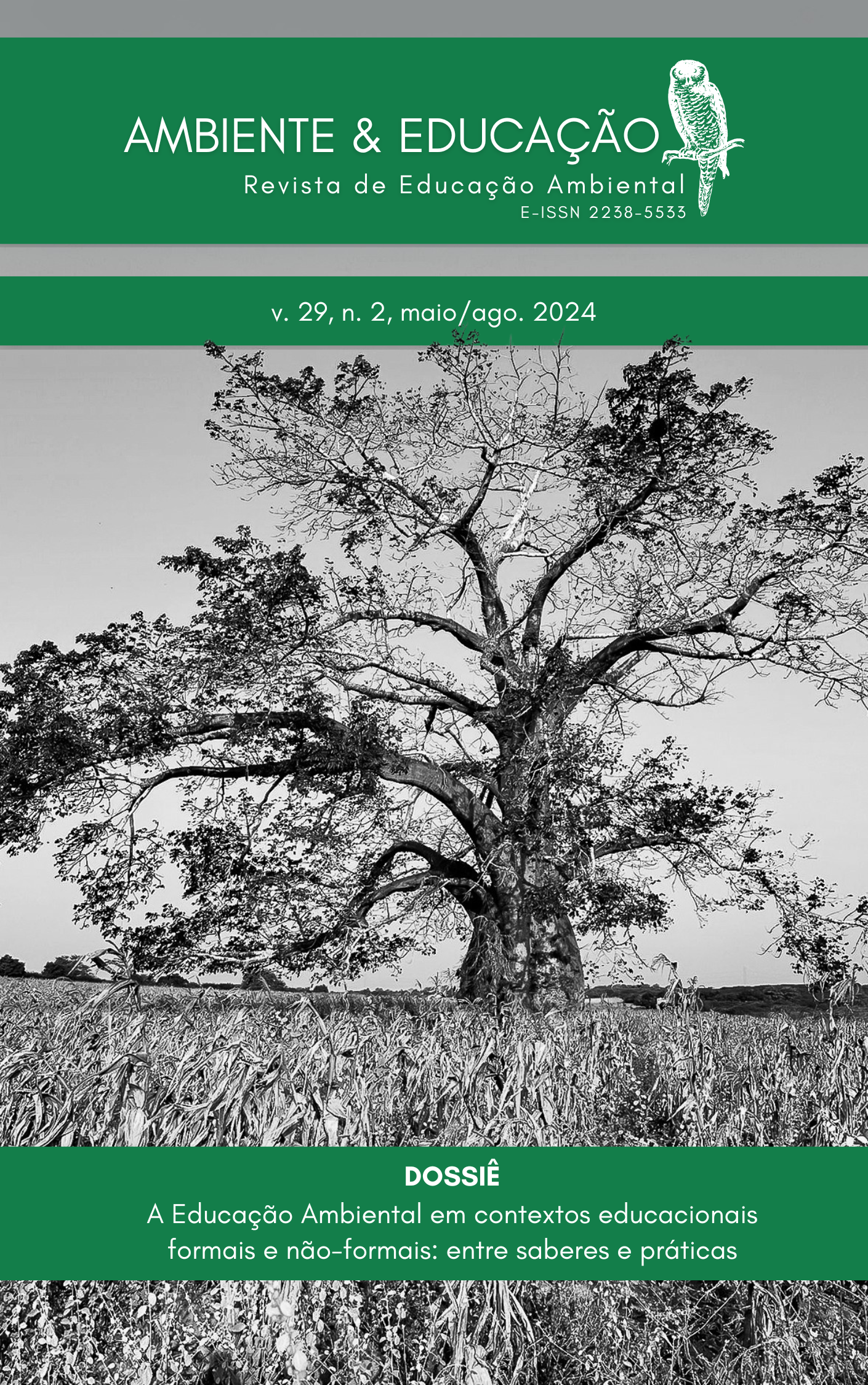Conhecimentos, dificuldades e intenções para o consumo alimentar sustentável entre universitários
DOI:
https://doi.org/10.63595/ambeduc.v29i2.16962Keywords:
Dietas sustentáveis, Universidade, Educação Ambiental, SustentabilidadeAbstract
The objective of this study was to identify and relate knowledge, challenges, intentions for change regarding sustainable food consumption among university students and their sociodemographic profile. The cross-sectional study investigated 158 university students using a structured questionnaire that were analyzed using descriptive and inferential analyses. It was found that those interviewed who reported more knowledge and ease of change were also those who had more intentions of carrying out sustainable actions. There were significant differences between the knowledge score and the variable degree (p<0.01), the difficulty score and the variables gender (p<0.00), race (p<0.02), income (p<0 .01), the intention score and the gender variable (p<0.00). These data demonstrate the window of opportunity regarding food and nutritional education and environmental education among university students in order to raise awareness of sustainable consumption.
Downloads
References
APOSTOLIDIS, Chrysostomos; MCLEAY, Fraser. Should we stop meating like this? Reducing meat consumption through substitution. Food policy, vol. 65, p. 74–89, 2016. DOI 10.1016/j.foodpol.2016.11.002. Available at: http://dx.doi.org/10.1016/j.foodpol.2016.11.002. DOI: https://doi.org/10.1016/j.foodpol.2016.11.002
BUENO, Paulo Henrique Toledo. Panorama geral das perdas e desperdício de alimentos e soluções para o acesso à alimentação. 51 f. Trabalho de Conclusão de Curso (Graduação em Engenharia de Alimentos) - Universidade Federal de Uberlândia, Patos de Minas, 2019.
CAPP, Edison; NIENOV, Otto Henrique. Bioestatística quantitativa aplicada. Universidade Federal do Rio Grande do Sul. Porto Alegre: UFRGS, 2020.
CLARO, Rafael Moreira; MAIA, Emanuella Gomes; COSTA, Bruna Vieira de Lima; DINIZ, Danielle Pereira. Preço dos alimentos no Brasil: prefira preparações culinárias a alimentos ultraprocessados. Cadernos de saude publica, vol. 32, no. 8, 2016. DOI 10.1590/0102-311x00104715. Available at: http://dx.doi.org/10.1590/0102-311x00104715. DOI: https://doi.org/10.1590/0102-311X00104715
DUCHIN, Faye. Sustainable consumption of food: A framework for analyzing scenarios about changes in diets. Journal of industrial ecology, vol. 9, no. 1–2, p. 99–114, 2005. DOI 10.1162/1088198054084707. Available at: http://dx.doi.org/10.1162/1088198054084707. DOI: https://doi.org/10.1162/1088198054084707
FOOD AND AGRICULTURE ORGANIZATION. Sustainable diets and biodiversity: Directions and solutions for policy, research and action. Rome, Italy: Food & Agriculture Organization of the United Nations (FAO), 2013.
FLETCHER, R.H.; FLETCHER, S.W. Epidemiologia clínica – elementos essenciais. 4. ed. Porto Alegre: Artmed Editora, 2006.
GARNETT, Tara. What is a sustainable healthy diet? A discussion paper. Food Climate Research Network, 2014.
GARZILLO, Josefa Maria Fellegger. A alimentação e seus impactos ambientais: abordagens dos guias alimentares nacionais e estudo da dieta dos brasileiros. 2019. Tese de Doutorado. Universidade de São Paulo.
GODFRAY, Charles. O desafio de alimentar nove mil milhões de pessoas em 2050. SANTOS J.L, CARMO I., GRAÇA P., et al. O futuro da alimentação: ambiente, saúde e economia. Lisboa: Fundação Calouste Gulbenkian, p. 18-32, 2013.
GOMES, Giancarlo; GORNI, Patricia Monteiro; DREHER, Marialva Tomio. Consumo sustentável e o comportamento de universitários: discurso e práxis! Revista Eletrônica de Ciência Administrativa, vol. 10, no. 2, p. 80–92, 2011. DOI 10.5329/recadm.20111002006. Available at: http://dx.doi.org/10.5329/recadm.20111002006. DOI: https://doi.org/10.5329/RECADM.20111002006
JACOB, Michelle Cristine Medeiros; ARAÚJO, Fábio Resende de. Desenvolvimento de competências para Nutrição no contexto de Sistemas Alimentares Sustentáveis. Ciencia & saude coletiva, vol. 25, no. 11, p. 4369–4378, 2020. DOI 10.1590/1413-812320202511.31652018. Available at: http://dx.doi.org/10.1590/1413-812320202511.31652018. DOI: https://doi.org/10.1590/1413-812320202511.31652018
KWASNY, Tatjana; DOBERNIG, Karin; RIEFLER, Petra. Towards reduced meat consumption: A systematic literature review of intervention effectiveness, 2001-2019. Appetite, vol. 168, no. 105739, p. 105739, 2022. DOI 10.1016/j.appet.2021.105739. Available at: http://dx.doi.org/10.1016/j.appet.2021.105739. DOI: https://doi.org/10.1016/j.appet.2021.105739
LEITZMANN, Claus. Nutrition ecology: the contribution of vegetarian diets. The American journal of clinical nutrition, vol. 78, no. 3, p. 657S-659S, 2003. DOI 10.1093/ajcn/78.3.657s. Available at: http://dx.doi.org/10.1093/ajcn/78.3.657s. DOI: https://doi.org/10.1093/ajcn/78.3.657S
MARTINELLI, Suellen Secchi; CAVALLI, Suzi Barletto. Alimentação saudável e sustentável: uma revisão narrativa sobre desafios e perspectivas. Ciencia & saude coletiva, vol. 24, no. 11, p. 4251–4262, 2019. DOI 10.1590/1413-812320182411.30572017. Available at: http://dx.doi.org/10.1590/1413-812320182411.30572017. DOI: https://doi.org/10.1590/1413-812320182411.30572017
MASON, Pamela; LANG, Tim. Sustainable diets: How ecological nutrition can transform consumption and the food system. London, England: Routledge, 2017. DOI: https://doi.org/10.4324/9781315802930
PARLASCA, Martin C.; QAIM, Matin. Meat consumption and sustainability. Annual review of resource economics, vol. 14, no. 1, p. 17–41, 2022. DOI 10.1146/annurev-resource-111820-032340. Available at: http://dx.doi.org/10.1146/annurev-resource-111820-032340. DOI: https://doi.org/10.1146/annurev-resource-111820-032340
PEREIRA, Maurício Gomes. Epidemiologia: teoria e prática. Rio de Janeiro: Guanabara-Koogan, 2001, 596 p.
SANTOS, Bruna Saraiva. Dieta vegetariana e dieta onívora relacionada com desempenho físico. Centro Universitário FADERGS, 2023.
SANTOS, Leandro; BIDARRA, Zelimar; SCHMIDT, Carla; STADUTO, Jefferson. Políticas públicas para o comércio de produtos orgânicos no Brasil. Revista de ciências agrárias, vol. 40, no. 2, p. 447–459, 2017. DOI 10.19084/rca16131. Available at: http://dx.doi.org/10.19084/rca16131. DOI: https://doi.org/10.19084/RCA16131
SCAGLIUSI, Fernanda Baeza; POLACOW, Viviane Ozores; CORDÁS, Táki Athanássios; COELHO, Desire; ALVARENGA, Marle; PHILIPPI, Sonia Tucunduva; LANCHA JÚNIOR, Antonio Herbert. Tradução, adaptação e avaliação psicométrica da Escala de Conhecimento Nutricional do National Health Interview Survey Cancer Epidemiology. Revista de Nutrição, vol. 19, no. 4, p. 425–436, 2006. DOI 10.1590/s1415-52732006000400002. Available at: http://dx.doi.org/10.1590/s1415-52732006000400002. DOI: https://doi.org/10.1590/S1415-52732006000400002
SOUZA, M.C.G.L. Consumo sustentável de carne: um estudo exploratório da reação dos consumidores às informações sobre maus tratos com animais de produção. Universidade Federal do Rio de Janeiro, 2011.
TRICHES, Rozane Marcia. Dietas saudáveis e sustentáveis no âmbito do sistema alimentar no século XXI. Saúde em Debate, vol. 44, no. 126, p. 881–894, 2020. DOI 10.1590/0103-1104202012622. Available at: http://dx.doi.org/10.1590/0103-1104202012622. DOI: https://doi.org/10.1590/0103-1104202012622
WALLÉN, Anna; BRANDT, Nils; WENNERSTEN, Ronald. Does the Swedish consumer’s choice of food influence greenhouse gas emissions? Environmental science & policy, vol. 7, no. 6, p. 525–535, 2004. DOI 10.1016/j.envsci.2004.08.004. Available at: http://dx.doi.org/10.1016/j.envsci.2004.08.004. DOI: https://doi.org/10.1016/j.envsci.2004.08.004
Downloads
Published
How to Cite
Issue
Section
License
Copyright (c) 2025 Emanuelly Pozzer dos Santos, Vitoria Regina Vieira Teixeira, Rozane Marcia Triches

This work is licensed under a Creative Commons Attribution-NonCommercial-NoDerivatives 4.0 International License.
Os (as) autores(as) que publicam nesta revista concordam com os seguintes termos: Os (as) autores(as) mantém os direitos autorais e concedem à revista o direito de primeira publicação, com o trabalho simultaneamente licenciado sob a Licença Creative Commons Atribuição-NãoComercial-SemDerivações (CC BY-NC-ND 4.0) que permite o compartilhamento do trabalho com reconhecimento da autoria e publicação inicial nesta revista. Os (as) autores(as) têm autorização para assumir contratos adicionais separadamente, para distribuição não-exclusiva da versão do trabalho publicada nesta revista (ex.: publicar em repositório institucional ou como capítulo de livro), com reconhecimento de autoria e publicação inicial nesta revista. Os (as) autores(as) têm permissão e são estimulados a publicar e distribuir seu trabalho online (ex.: em repositórios institucionais ou na sua página pessoal) em qualquer ponto antes ou durante o processo editorial, já que isso pode aumentar o impacto e a citação do trabalho publicado.












